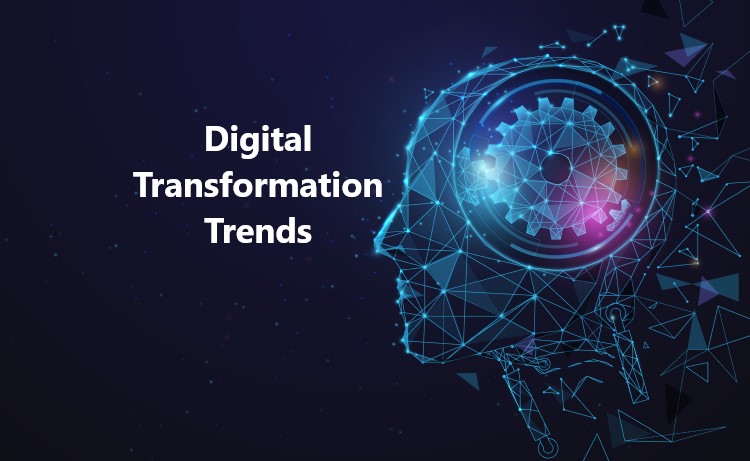 Digital transformation trends are reshaping the way businesses operate and interact with customers. From AI and automation to cloud computing, these innovations help companies streamline processes and boost efficiency. Embracing these trends allows you to stay competitive, adapt quickly, and meet customer expectations in an increasingly digital world. As technology evolves, understanding and applying these trends can position your business for sustainable growth. By focusing on data-driven decision-making, enhanced security, and personalized customer experiences, you build a more resilient and responsive operation. Exploring these trends will equip your business to succeed in today’s dynamic market environment.
Digital transformation trends are reshaping the way businesses operate and interact with customers. From AI and automation to cloud computing, these innovations help companies streamline processes and boost efficiency. Embracing these trends allows you to stay competitive, adapt quickly, and meet customer expectations in an increasingly digital world. As technology evolves, understanding and applying these trends can position your business for sustainable growth. By focusing on data-driven decision-making, enhanced security, and personalized customer experiences, you build a more resilient and responsive operation. Exploring these trends will equip your business to succeed in today’s dynamic market environment.
AI and Machine Learning in Business Operations
AI and machine learning are transforming business operations by streamlining processes, enhancing decision-making, and increasing efficiency. These technologies help automate repetitive tasks, saving time and reducing errors. For example, AI can handle data entry, manage inventory, and even monitor equipment for maintenance needs. This automation frees employees to focus on more strategic work, making your operations more effective.
In decision-making, machine learning can analyze large amounts of data to uncover patterns and trends. With these insights, you can make informed choices based on real-time data rather than relying on intuition. This is especially valuable in industries like finance, retail, and healthcare, where quick, accurate decisions can have a significant impact. By supporting data-driven choices, AI and machine learning contribute to better outcomes and reduce risk.
AI also helps businesses adapt to changing digital transformation trends. As markets evolve, these technologies enable you to respond faster to customer needs, predict demand shifts, and refine your strategies. This agility can set your business apart, allowing you to remain competitive in a rapidly shifting landscape. Adopting AI and machine learning empowers your organization to work smarter, stay adaptable, and maximize efficiency across various areas of operation.
Cloud Computing and Remote Collaboration
Cloud computing has transformed remote work by making data and applications accessible from anywhere, enhancing collaboration and productivity. With cloud technology, teams can access files, tools, and systems in real-time, eliminating the need for location-specific servers. This accessibility is crucial for remote teams who rely on seamless communication and quick information sharing.
Collaboration tools hosted on the cloud, such as shared document platforms and video conferencing, have become essential in a digital-first world. These tools allow team members to work together, share updates, and stay connected, regardless of location. As a result, projects can progress smoothly, with fewer delays due to time zones or physical distance. By enabling real-time communication and collaboration, cloud technology supports faster decision-making and more efficient workflows.
As digital transformation trends continue to evolve, cloud computing remains a key component in modern business operations. It offers flexibility, scalability, and cost-effectiveness, allowing you to scale resources up or down as needed. This adaptability not only enhances remote work but also prepares your business for future changes in the workplace. Embracing cloud computing strengthens your ability to stay agile, support remote teams, and maintain productivity across various environments.
Automation and Process Optimization
Automation and process optimization are key drivers in boosting productivity and reducing operational costs. By automating routine tasks like data entry, order processing, and invoicing, you free up valuable time for your team. This allows employees to focus on more strategic work, ultimately increasing efficiency and morale. Automation also minimizes human errors, leading to greater accuracy and fewer costly mistakes.
Examples of automation can be seen across various business functions. In customer service, chatbots handle frequent inquiries, providing immediate responses to customers and reducing wait times. In manufacturing, robotic process automation (RPA) streamlines production tasks, improving speed and quality. These automated systems keep operations running smoothly, even during peak periods, and reduce labor costs over time.
Digital transformation trends increasingly emphasize the importance of automation in staying competitive. Businesses that embrace automation can quickly adapt to market demands, scale operations efficiently, and improve service levels. Additionally, process optimization enables you to identify inefficiencies and refine workflows continuously. By combining automation with ongoing improvements, you create a more resilient, adaptable organization that can thrive in a fast-paced environment.
Data-Driven Decision Making and Analytics
Data-driven decision-making and analytics have become essential in today’s business environment. By leveraging big data, you gain insights that improve your ability to make informed decisions. Advanced analytics tools allow you to analyze large datasets quickly, revealing patterns and trends that guide strategic planning. This approach supports more precise forecasting, enabling you to respond to market changes effectively.
Understanding customer needs is another benefit of data-driven analytics. By examining purchasing behaviors, feedback, and engagement metrics, you can anticipate what your customers want. Predictive analytics helps identify potential demand shifts, allowing you to adjust products or services accordingly. This responsiveness builds customer satisfaction and loyalty, giving your business a competitive advantage.
As digital transformation trends continue to evolve, data-driven decision-making will play a central role. Companies that embrace analytics are better equipped to adapt, innovate, and succeed in changing markets. With the right data tools, you can streamline operations, reduce waste, and optimize resources. By focusing on data, you make smarter choices that drive growth and enhance overall business performance.
Cybersecurity Innovations for Modern Threats
Cybersecurity innovations are essential to protect business data from modern threats in an increasingly digital world. As digital transformation trends push more operations online, companies face greater risks from cyberattacks. Advanced cybersecurity measures, such as multi-factor authentication (MFA) and endpoint detection and response (EDR), are helping businesses safeguard sensitive information. MFA adds an extra layer of security by requiring multiple forms of identification, making unauthorized access more difficult.
Another key innovation is the use of artificial intelligence (AI) and machine learning in threat detection. AI-driven systems can analyze vast amounts of data to identify unusual patterns, enabling quicker responses to potential threats. This proactive approach allows companies to prevent breaches before they escalate, saving time and resources. Additionally, zero-trust security models are becoming more common, requiring every user and device to be verified, regardless of their location within the network. This approach minimizes internal threats, especially as remote work continues to expand.
As businesses continue to adopt digital transformation trends, cybersecurity must keep pace with these advancements. Regularly updating security protocols and training employees are essential steps to maintaining a secure environment. With these innovations, you can better protect your data, reduce vulnerability, and build trust with customers. Investing in the latest cybersecurity measures prepares your business to handle today’s evolving threats while supporting a secure and resilient digital presence.
Customer Experience and Personalization
Personalizing customer experiences is becoming a core part of digital transformation trends, helping businesses build long-term loyalty and satisfaction. By using digital tools, you can tailor interactions based on customer preferences, behaviors, and past purchases. This personalization makes customers feel valued and understood, which leads to stronger connections and increased engagement.
Digital tools like AI-driven recommendation engines and CRM platforms enable you to provide relevant product suggestions, personalized messages, and timely offers. For example, e-commerce sites often use AI to recommend products based on previous browsing or purchase history. This approach not only increases the chances of repeat purchases but also enhances the overall customer experience. By delivering the right message at the right time, you create a seamless, enjoyable journey that keeps customers coming back.
Personalization also builds trust, as customers appreciate a tailored approach that recognizes their unique preferences. By investing in these strategies, you show that you understand as well as value their needs. As digital transformation trends continue to evolve, businesses that embrace personalization are more likely to retain customers in a competitive market. This focus on customer experience becomes a powerful tool for driving long-term success and also creating lasting brand loyalty.
Conclusion
Staying updated on digital transformation trends is essential for keeping your business competitive and adaptable. By embracing tools like AI, cloud computing, and automation, you can streamline operations and improve decision-making. These innovations not only increase efficiency but also enhance customer experience through personalization and responsiveness. Focusing on security and customer-centric strategies builds trust as well as long-term loyalty, helping your business thrive in a digital landscape.
As digital transformation trends continue to evolve, being proactive with these changes will prepare you for future growth. Leveraging these trends helps you stay agile, meet customer expectations, and also create a more resilient business. By integrating these strategies, you position your company for sustainable success in a rapidly changing market.


